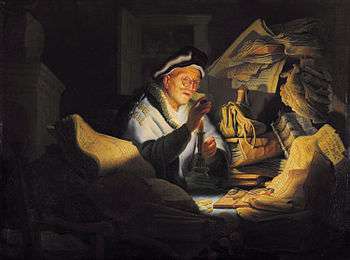Parable of the Rich Fool
The Parable of the Rich Fool is a parable of Jesus which appears in Luke 12:16–21. It depicts the futility of the belief that wealth can secure prosperity or a good life.

The parable has been depicted by artists such as Rembrandt.
Narrative
The parable is introduced by a member of the crowd listening to Jesus, who tries to enlist Jesus' help in a family financial dispute:[1]
One of the multitude said to him, "Teacher, tell my brother to divide the inheritance with me." But he said to him, "Man, who made me a judge or an arbitrator over you?" He said to them, "Beware! Keep yourselves from covetousness, for a man's life doesn't consist of the abundance of the things which he possesses."
— Luke 12:13–15, World English Bible
In Luke's account Jesus then responds with the parable:
He spoke a parable to them, saying, "The ground of a certain rich man brought forth abundantly. He reasoned within himself, saying, 'What will I do, because I don't have room to store my crops?' He said, 'This is what I will do. I will pull down my barns, and build bigger ones, and there I will store all my grain and my goods. I will tell my soul, "Soul, you have many goods laid up for many years. Take your ease, eat, drink, be merry."' "But God said to him, 'You foolish one, tonight your soul is required of you. The things which you have prepared—whose will they be?' So is he who lays up treasure for himself, and is not rich toward God."
— Luke 12:16–21, World English Bible
An abbreviated version of this parable also appears in the non-canonical Gospel of Thomas (Saying 63).[2]
Interpretation
The rich farmer in this parable is portrayed negatively, as an example of greed.[1] By replacing his existing barn, he avoids using agricultural land for storage purposes, thus maximising his income, as well as allowing him to wait for a price increase before selling.[1] St. Augustine comments that the farmer was "planning to fill his soul with excessive and unnecessary feasting and was proudly disregarding all those empty bellies of the poor. He did not realize that the bellies of the poor were much safer storerooms than his barns."[3]
Arland J. Hultgren comments that the parable "provides an example of what one ought not to be like. The person whose identity is tied up with his or her possessions, status, and/or achievements—and is driven by acquiring them—can so easily end up unaware of the call of God and the need of the neighbor."[4]The farmer's conversation with himself is self-centred: first-person pronouns occur 11 times.[4] In rhetorical terms, it is an example of stream of consciousness, also called interior monologue, that serves as a narrative device to inform the reader of a character’s tragic flaw, in this case, the rich man’s overweening confidence or hubris.[5]
The farmer's foolishness lies particularly in the fact that wealth cannot guarantee the future: the Day of Judgment arrives sooner than he expects.[6]
Ellicott's Commentary notes the difference between the fool's approach and the psalmist's:
Return unto thy rest, O my soul; for the LORD hath dealt bountifully with thee.[7]
"The psalmist's repose is not the worldling's serenity nor the sensualist's security, but the repose of the quiet conscience and the trusting heart".[8]
Depictions
This parable has been depicted by several artists, including Rembrandt, Jan Luyken, James Tissot, and David Teniers the Younger.
References
- Joel B. Green, The Gospel of Luke, Eerdmans, 1997, ISBN 0-8028-2315-7, pp. 487–491.
- Gospel of Thomas: Lamb translation and Patterson/Meyer translation
- Arthur A. Just, Luke, InterVarsity Press, 2003, ISBN 0-8308-1488-4, p. 208.
- Arland J. Hultgren, The Parables of Jesus: A Commentary, Eerdmans, 2002, ISBN 0-8028-6077-X, pp. 104-109.
- James L. Resseguie, "A Glossary of New Testament Narrative Criticism with Illustrations," in Religions, 10 (3: 217), 6-7; see also Michal Beth Dinkler, "'The Thoughts of Many Hearts Shall be Revealed’: Listening in on Lukan Interior Monologues," Journal of Biblical Literature 134 (2015): 373–99; Phillip Sellew, "Interior Monologue as a Narrative Device in the Parables of Jesus," Journal of Biblical Literature 111 (1992): 239–53.
- John Clifford Purdy, Parables at Work, Westminster John Knox Press, 1986, ISBN 0-664-24640-0, pp. 41-43.
- Psalm 116:7
- Ellicott's Commentary on Psalm 116, accessed 20 June 2018
External links
